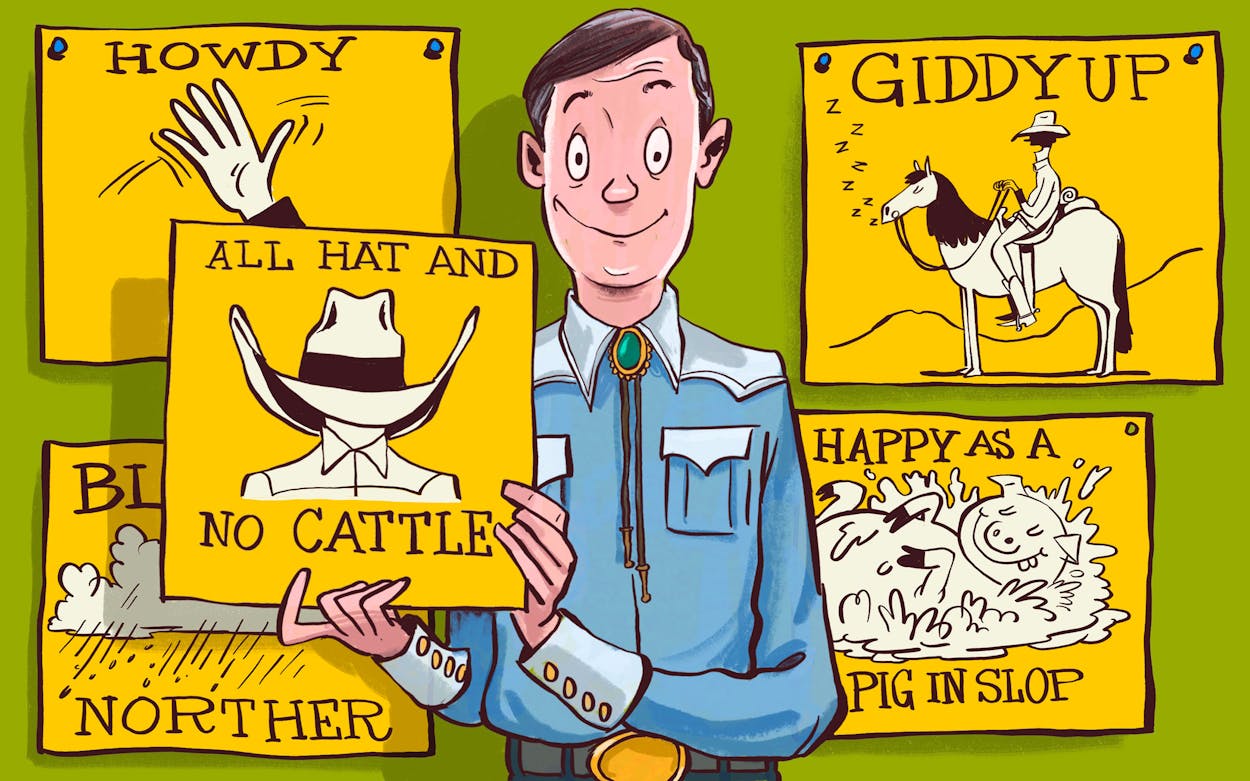Even if you’re not BOI and you have no idea what a feeder road is, the Texanist is here to help.
Q: I’m about to move from California to Galveston. In lieu of “shaka, bruh,” “surf’s up,” or “hella cool,” what are some words and phrases I should learn to use in conversation?
Dianne White, Santa Barbara
A: Howdy, and welcome to Texas! Moving to a new state can be an exhausting and life-altering experience. And pulling up stakes on the West Coast—pretty Santa Barbara, no less—and putting down new ones on Galveston Island, off the Third Coast, presents an extra layer of cultural disruption on top of the logistical challenges that come with transplanting oneself. That’s because we Texans take our state culture and identity more seriously than most.
The Texanist assumes that you did your due diligence and will not be surprised at what awaits you upon your arrival. Thus, you’re probably familiar with some of our beloved brands, such as H-E-B, Dr Pepper, and Whataburger (it’s better than In-N-Out) our favorite musicians, from Beyoncé to Willie Nelson; and maybe you’ve heard that our devotion to barbecue and tacos is such that this very magazine employs two full-time staff editors focused on those toothsome cuisines. So instead of dillydallying on these and other cultural quirks, the Texanist will divert your attention by pointing out that, in relocating from the Golden State to the Lone Star State, you are far from alone. In fact, more new Texans hail from California than any other state—to the tune of about a hundred thousand a year.
Of all those, however, you, Ms. White, are the first to have been so thoughtful as to reach out to the Texanist to ask for assistance with assimilating to your new home. You are to be applauded for doing so. Texans are, generally speaking, a welcoming lot. “Friendship,” after all, is our state motto. But we can also sometimes be a little cagey around new arrivals—and, be warned, we often engage in good-natured ribbing about Californians in particular—so learning the basics of the Texas tongue might be advantageous as you get to know your new neighbors.
Galveston, by the way, is a great place. As you’ll soon learn, the island is steeped in history and boasts a long list of notable inhabitants, including, very probably, the Spanish explorer Álvar Núñez Cabeza de Vaca, who washed ashore there in 1528, and the pirate Jean Lafitte, who headquartered his privateering and smuggling empire out of the island some three hundred years later. The city was also home to Norris Wright Cuney, a distinguished politician and pioneering Black activist; Jack “the Galveston Giant” Johnson, the first Black world heavyweight boxing champion; Barry White, the deep-voiced vocalist and songwriter who penned so many memorable funk and soul hits; oilman George Mitchell, the father of fracking; Beyoncé’s mom, Tina Knowles; and the Texanist’s dear, departed Texas Monthly colleague Paul Burka, as well as many others.
Among the notable history the Texanist referenced, you should know that Galveston was once such a bustling hub of activity and commerce that it was, in the late 1800s, Texas’s largest city, as well as home to the state’s first structure with electric lights, the first telephone, and the first baseball game. You’ll also be interested to know that one significant moment in Galveston’s past occurred on June 19, 1865, when Union General Gordon Granger arrived on the island and made the delayed announcement of the end of slavery, which is, of course, commemorated on the federal holiday of Juneteenth.
The Texanist could go on ad nauseam about Galveston’s rich history, but instead will cut to the chase and start you off with a few handy words and phrases that will have you talking Texan fast.
So here is a short list of ten important Texas terms to know. The Texanist has ordered the list roughly from most to least common, with the lingo you’ll hear on day one near the top. Should you wish to dive deeper into your linguistic education, the Texas Monthly archives are a veritable treasure trove. We’ve got lists of colorful sayings (including a very long and very colorful one by the Texanist’s former colleague Anne Dingus) and weather terms, as well as practical guides on such sundry topics as how to buy cowboy boots, how to mix a Texas margarita, and where to go on vacation. Happy trails!
Y’all. Commonly deployed across the state and the South as a whole, here, of course, is the contraction of “you” and “all,” the Texasy second-person plural pronoun. Hot tip: The possessive form is “y’all’s,” and anyone telling you otherwise is pulling your leg.
Howdy. Just as the Texanist opened his response here, “howdy” is a simple hello-like greeting. It is, in fact, the official greeting of Texas A&M University, but the Aggies don’t hold the copyright, and everyone is encouraged to say “howdy.” When you feel ready, “hidy” is an even folksier way to greet a person.
BOI. This is an acronym for “born on the island” and refers to a person who is a native of Galveston. Barry White, Beyoncé’s mom, and Paul Burka, for example, are all BOI.
Feeder road. This is a very Houston-centric way of referring to freeway access roads, aka service roads. Being in such close proximity to Space City, you’ll probably hear it a lot. And while we’re on the subject of highways, we Texans don’t say “the” before our freeway names, as Californians do. So while you may be used to sitting in traffic on the 405 in Los Angeles, prepare to complain about congestion on I-10 instead.
All hat and no cattle. This Texpression is used to describe a big-talking braggart or a sort of charlatan but is also akin to the familiar “all bark, no bite” expression. Don’t be all hat and no cattle.
Fixin’ to. Here is the Texan way of saying that one is readying to do something. “The Texanist has had a long day doling out fine advice, and he’s fixin’ to pop open a cold beer.”
Giddyup. Yes, “giddyup” is an imperative verb meaning to get going, but it can also be deployed in the form of the saying, “hitch in my giddyup,” which means to have an injury or physical malady or some sort of delay in one’s doings. For example, “The Texanist has had a long day doling out fine advice and he’s fixin’ to pop open a cold beer, but it will take some time to get to the ice chest in the bed of his truck because he twisted his ankle roller-skating last weekend and has a hitch in his giddyup.”
Puredee. Authentic, thoroughgoing, wholly unadulterated. “Though Dianne White is new to the Lone Star State, soon enough she will be speaking like a puredee Texan.”
Blue norther. A meteorological phenomenon involving a rapidly moving autumnal cold front that brings a rapid drop in the mercury, maybe a little precipitation, and skies with a dreary blue hue.
Happy as a hog in slop. Sometimes you’ll hear the variant “happy as a hog in mud,” but either way, because hogs love both mud and slop, the phrase is a way to express great elation.
Good luck with the move and, again, welcome to Texas!
- More About:
- The Texanist
- Galveston








